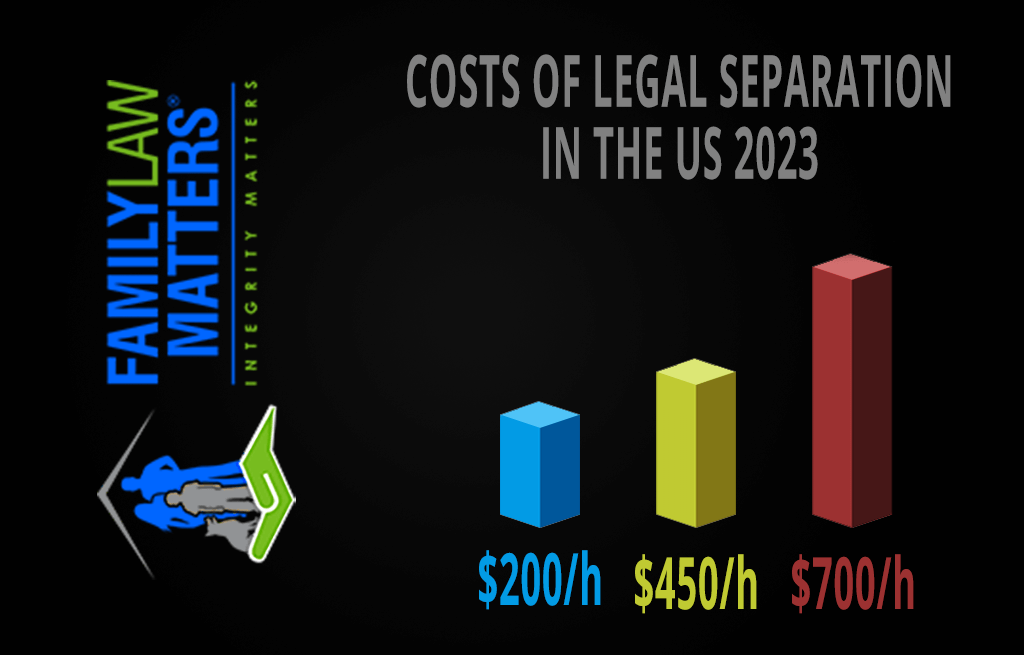How to file for legal separation in California
If you are considering legal separation in California, it is important to understand the potential implications on all aspects of your life. In addition to addressing issues related to the separation of your relationship, legal separation also involves determining issues related to spousal support, property division, and child custody. These issues can be complex and require the assistance of an experienced attorney who can guide you through the process and ensure that your rights and interests are protected.
Exploring Divorce Alternatives: A Guide to Legal Separation, Separation Agreements, Mediation, and Marital Separation in California
In California, couples who are considering divorce may also explore alternatives such as legal separation and mediation. A marital separation can provide spouses with time and space to evaluate their marriage and decide if they want to pursue a divorce or try to reconcile. During the separation process, couples can work out the terms of their separation agreement, including child custody, spousal support, and property division. Mediation can help couples work out their problems without having to fight in court, which can be expensive and take a long time. By considering divorce alternatives such as legal separation and mediation, couples can often find solutions that work best for their unique situation.
What is Legal Separation? Understanding the Difference from Trial Separation and How it Works in California
People who call our office at Family Law Matters, often pose the question, “What is legal separation?” This is because you know that you cannot live together with your spouse anymore, because your relationship is no longer working.
A court order separating you and your spouse is known as a “legal separation” in the state where you and your partner currently reside.
You and your spouse cannot even be in the same room without arguing. The problem is that you are not ready to give up on the marriage just yet. There still may be some way the two of you can repair your relationship.
A legal separation is an official court order from the state where you and your partner live apart and carry on your lives separately.
Married couples often believe that a trial separation is a good idea.
The two of you can be apart for a while to see how things go. People frequently believe they need to hire a lawyer and file formal paperwork in order to proceed with a trial separation.
What couples often do not understand is that they can be legally separated without having to file for a legal separation. There is a difference.
What is the Difference Between Being Legally Separated and a Legal Separation in California?
Being legally separated is a state of mind. It is when one spouse in a marriage decides that the relationship is broken forever and cannot be fixed- no matter what happens.
That spouse then takes some action to end the relationship- such as moving out or separating the finances. For a separation to be legally binding, there are no legal papers required.
However, when spouses file in California for a legal separation, they are filing a lawsuit in the court. This action, called a “legal separation” is very much like a divorce.
In California, a Legal Separation must meet certain requirements.
There is no residency requirement in California for a legal separation, which means that you don’t have to be a California resident for six months or even a resident of the county in which you are filing for a minimum of three months.
The courts issue orders for property division, debt division, spousal support, child support and child custody.
The proceeding is very much like a divorce. The only difference is at the end of the litigation, the parties remain married and have to file new paperwork to end the marriage.
When people ask us about a California legal separation, they often are asking about a trial separation.
The question is, “Do I need to do anything legally if my spouse and I want to separate temporarily?” “No,” is the answer. If you’re contemplating divorce but aren’t sure if it’s for you, there’s nothing you need to do.
You and your spouse can live separate and apart without filing formal documents with the court.

Benefits of Filing for Legal Separation
There are several benefits to filing for legal separation in California, including:
Formal separation of assets and debts:
Filing for legal separation allows spouses to formally separate their assets and debts. This can help to prevent future disputes over property division in the event of divorce.
Protection of assets:
Legal separation can protect assets from being considered community property, which is subject to division in a divorce. This can be particularly important in cases where one spouse has significant assets or debts. Health insurance benefits: In some cases, legal separation may allow a spouse to maintain health insurance benefits through the other spouse’s employer. Religious or personal beliefs: Some couples may choose legal separation over divorce due to religious or personal beliefs that prevent them from seeking a divorce.
Trial separation:
Legal separation can provide a trial period for couples who are unsure if they want to continue their marriage or pursue a divorce. During this time, they may work on their relationship or seek counseling.
It is important to note that legal separation does not terminate the marriage, and therefore, the parties cannot remarry. If a legal separation ultimately leads to divorce, the terms of the legal separation agreement may be incorporated into the divorce settlement. It is recommended that you consult with an experienced family law attorney in California to determine if legal separation is the best option for your specific situation.

FAQ
The legal separation can be finalized prior to the so-called “six-month minimum time frame” required for a divorce. This is due to the absence of a marriage termination date in a legal separation.
Currently, the filing fee for a legal separation in California is $435, although this fee may differ in Riverside, San Bernardino, and San Francisco counties. During the legal separation procedure, many issues are handled similarly to divorce, including property, assets, debt, and child custody. Yet, the cost of legal separation in California can vary greatly. It depends on whether you handle it yourself, use online services, or hire an attorney. Court filing fees are also a factor and can be several hundred dollars. If lawyers are involved, costs can increase significantly due to hourly rates and complexity of the case.
You and your spouse are not yet prepared to negotiate a comprehensive divorce settlement. Legal separation safeguards your rights and financial interests while you and your spouse decide whether or not to divorce.
The primary distinction lies in the finality of your decision. When a couple legally separates, they can live and act as separate individuals but can reunite as a married couple. Nevertheless, following a divorce, the decision to end the marriage is final and you are officially single.
Despite the fact that legal separation is not obligatory, many couples do file for separation prior to finalizing their divorce. There is a six-month mandatory waiting period in California after a couple files for divorce before the court can issue an order dissolving the marriage.
The three most significant disadvantages of legal separation are:
- Legal separations are just as complex as divorces.
- Equally stressful are legal separations and divorces.
- There may be no need for a legal separation in your relationship.
If the tax law considers you to be “unmarried” because you received a decree of separation maintenance before December 31, you may file as “single” or “head of household.” To qualify as “head of household,” you must have a dependent and pay at least half of the costs associated with maintaining a home.
Avoid These 5 Mistakes During Your Separation
- Keep things secret. Immediately after announcing a divorce, everyone will have a viewpoint…
- Do not leave your home.
- Do not pay more than your fair share.
- Avoid rushing into a rebound relationship.
- Do not delay the inevitable.
Obtaining a court decision
If children are involved in a legal separation, the judge determines their custody, maintenance, and education in accordance with their best interests and their legal rights. If possible, the judge considers any agreement reached between the parties.
You’d like to keep some of the perks of marriage, including being covered by your spouse’s health insurance. Being eligible for deductions on taxes Recipients of state aid (e.g. Social Security)
The decision that a married couple cannot be considered legally separated if they continue to live together was made by the Supreme Court of California in 2015. As long as they continue to share a residence, a divorced couple will continue to acquire property that will be considered community property when it comes time to divide their belongings.
Positive aspects of legal separation
Both parties retain their medical, life, and other insurance benefits under a formal separation. If the marriage has been long-lasting enough, both partners are eligible to receive the other’s social security payments. In addition, tax benefits continue after a legal separation.
A legal separation agreement is a document that outlines the terms of a separation between two parties who are legally married but no longer wish to live together. The agreement can address issues such as property division, spousal support, child custody, and visitation rights. It is important to note that a legal separation agreement is a legally binding document, and failure to adhere to the terms outlined in the agreement can result in legal consequences.
Legal separation and divorce are both legal processes that allow married couples to separate, but there are some key differences between the two. In a legal separation, the couple remains legally married but lives separately, whereas in a divorce, the marriage is legally terminated. Legal separation can be a good option for couples who are unsure if they want to get a divorce, but want to live apart and address issues such as property division and child custody. Divorce is usually the better option for couples who want to end their marriage permanently.
An uncontested legal separation is when both parties agree on the terms of the separation, including property division, spousal support, and child custody. In an uncontested legal separation, the couple can often avoid a lengthy and costly court battle. This type of separation can also be less stressful and emotionally taxing than a contested separation or divorce. It is important to have a qualified attorney review the separation agreement to ensure that it is legally binding and that your rights are protected.
Mediation is an option for couples who want to reach an agreement on their legal separation outside of court. A mediator is a neutral third party who helps the couple communicate and negotiate their differences. A mediator does not make decisions for the couple, but rather helps them to reach an agreement that is mutually acceptable. Mediation can be a cost-effective and time-efficient way to resolve legal separation issues.
To file for legal separation in California, you must complete and file the necessary paperwork with the court. This typically includes a Petition for Legal Separation, which is filed by the spouse initiating the separation, and a Response to the Petition, which is filed by the other spouse. You will also need to provide information about your income, assets, and debts, as well as any children you have. Once the paperwork is filed, you will need to serve the other spouse with a copy of the Petition and a Summons. It is recommended to hire an attorney to assist with the process.
The Average Cost of Filing for Legal Separation:
The cost of legal separation varies widely, with average prices ranging from $1,000 to $100,000 in the US for 2023. Uncontested legal separation cases can settle for as low as $1,000, while highly contested separations involving matters like legal decision making and alimony can get up into the $100,000 range.
Factors Affecting Legal Separation Costs:
Several factors affect the cost of legal separation. These factors include attorney fees, third-party involvement, and the location where you live.
The Location Where You Live:
One of the primary factors affecting legal separation costs is the location where you live. The cost of living and the cost of legal services can vary significantly from state to state and even from city to city within a state.
Legal Separation Lawyer Fees:
Attorney fees can vary greatly when it comes to legal separation cases. Some lawyers may charge a flat fee for their services, while others may bill hourly. The hourly rate can range from $200 to $1,000 or more depending on the lawyer’s experience and the location of the case. The total cost of attorney fees will ultimately depend on the complexity of the case and the amount of time the lawyer spends on it. It’s important to discuss attorney fees with potential lawyers before hiring them to ensure that you understand the costs involved and that they fit within your budget.
Third-Party Involvement and Associated Fees:
Comparing Contested and Uncontested Legal Separation Costs:
Legal separation costs can also vary depending on whether the case is contested or uncontested. Uncontested cases typically settle for a lower cost, while contested cases can lead to higher legal fees, third-party fees, and other associated costs.
In conclusion, understanding the average cost of legal separation and the factors that impact it is essential for those considering this process. Hiring an experienced attorney and considering other potential costs can help you plan for the financial implications of legal separation.
The length of the legal separation process in California depends on several factors, including whether the separation is contested or uncontested, the complexity of the case, and the backlog of the court. Generally, uncontested legal separations can be completed more quickly than contested separations. In California, there is a mandatory waiting period of six months before a legal separation can be finalized. This waiting period starts from the date the Petition for Legal Separation is served to the other spouse. However, the actual length of the legal separation process can vary widely, and it is important to discuss timelines with your attorney.
- Provides time for couples to work on their issues and possibly reconcile.
- Allows for the division of assets, debts, and property.
- Can help establish custody and support arrangements for children.
- Allows for the continuation of certain benefits, such as health insurance.
- Religious beliefs that do not allow for divorce can still be respected.
- It does not provide the finality of a divorce.
- Couples remain legally married and cannot remarry.
- It may not be recognized in some states.
- Can still be emotionally and financially taxing.
- May not resolve underlying issues that caused the separation.
During legal separation, both spouses have rights and responsibilities that need to be followed. These may include:
- Living separately and not interfering in each other’s lives.
- Providing support to each other or to any children involved.
- Complying with any agreements made regarding property, debts, and assets.
- Following any court orders or mediation agreements.
- Maintaining health and life insurance policies.
Typically, there are three general types of separation: trial, permanent, and legal. Trial separation is when you live apart for a period of time to decide whether to separate permanently. Permanent separation is when you live apart with no intention to reunite. Legal separation is a court-recognized status where you live apart but are still legally married.
The speed of obtaining a legal separation in California depends on the complexity of your case and the court’s schedule. If both parties agree, it can be relatively quick. However, if there are disputes, it could take several months to a year or more
Property Division - Protecting Your Assets in a Separation Case
Since a legal separation, as stated in California law, separates the parties’ finances, the action is helpful when the parties do not want a divorce but are worried about some future financial liability. The filing of a legal separation could protect you under the following circumstances:
- One spouse is wants to be protected from the liability of the other spouse driving under the influence of a controlled substance
- One spouse is anticipating significant medical expenses and the other spouse wants to be protected
- One spouse is a compulsive gambler and the other spouse does not want to be liable for debts incurred as a result
- One spouse is a compulsive spender and is using community money to incur debt
Reasons for a Legal Separation in California
A legal separation is only appropriate in a very narrow set of circumstances. The most common circumstances include
- Religion: Your religious beliefs prohibit you from filing for a divorce
- Health Insurance: One spouse needs continued coverage on the other’s medical insurance due to health reasons.
- Retirement Benefits: You have not yet been married long enough to have a vested interest in the other spouse’s retirement benefits.
- Social Security Benefits: You have been married less than ten years and one spouse would like the right to collect derivative Social Security benefits from the other.
What Are the Issues Involved?
- Child Custody: refers to who has decision-making authority over the marriage’s children and where they live. Child Visitation refers to the day-to-day parenting schedule, including holidays and vacations.
- Child Support: California has standardized “guidelines” for calculating child support that are based on the income of each parent and the amount of time the children spend with each parent.
- Spousal Support: Also referred to as alimony, the sub-issues of whether or not support is appropriate, the amount of support to be paid, and the duration of support should all be addressed.
- Property division: everything held, from retirement funds, bank accounts, and real estate, to furniture, furnishings, and appliances, must be divided in some way.
- Allocation of debts: All debts, including credit card obligations, personal loans, and tax bills, must be divided.
- Attorney fees: There are two primary reasons why a person may be required to pay the legal separation attorney fees of the other spouse. One reason is that one spouse has a larger financial ability to pay attorney fees than the other, and the other reason is because one spouse has acted inappropriately throughout the divorce procedures and gets punished.
The issue of marital status is conspicuously absent. You are still legally married to your spouse if you obtain a Judgment of Legal Separation.
If you desire to divorce your spouse following the finalization of your Legal Separation, you must submit a completely new and distinct dissolution of marriage lawsuit.
Notably, for California to have the authority (jurisdiction) to issue custody or visitation orders, the children must meet residency requirements, with the exception of emergency situations. Consequently, if you require child custody or child visitation orders, you may desire to investigate alternate options.
Family Law Matters Discusses The Difference Between Legal Separation and Divorce
The following figure provides an overview of California's legal separation laws, including the grounds for legal separation and the method for obtaining a court order.
Statutes Family Code Chapter 2310 (grounds for separation)
Family Code Chapter 2330 (process to initiate separation)
Family Code section 2030 (requests for separation attorney fees)
Our family law firm handles legal separation cases professionally and result-oriented. Contact our legal separation attorneys today to discuss your case today.
References:
“Divorce Alternatives: Mediation vs. Collaborative Divorce vs. Legal Separation” by DivorceNet https://www.divorcenet.com/resources/divorce/divorce-alternatives/mediation-vs-collaborative-divorce-vs-legal-separation
“Marital Separation” by Investopedia https://www.investopedia.com/terms/m/marital-separation.asp


